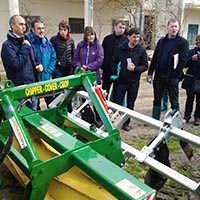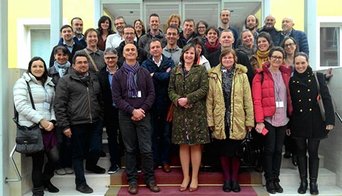SoilVeg
Improving soil conservation and resource use in organic cropping systems for vegetable production
Background
Agro-ecological Service Crops (ASC) are introduced in the agro-ecosystems to provide or enhance ecological services, thus promoting the whole soil-plant system equilibrium. ASC introduction and proper management have impact on soil quality and fertility and soil nutrients losses. They also contribute to increase soil C sink potential, to mitigate GHG emissions and influence weeds, diseases and pests occurrence.
To avoid competition with the subsequent cash crops, the growth of the interposed ASC is terminated in advance of the cash crop planting. The traditional, most widespread, technique used to terminate the ASC is incorporation as green manure into the soil by tillage. Since tillage is an energy and labour consuming and soil disturbing operation, the use of no/reduced tillage techniques, as the rolling crimping technology that terminates by flattening the ASC, has received increasing interest. The main challenge of the project will be to test the hypothesis that, compared with the incorporation of ASC into the soil as green manure, the use of the roller crimper reduces nutrient losses from the soil/plant system and GHG soil emission.
Main project activities
- Stakeholder involvement and innovation transfer.
- Crop performance evaluation and energy efficiency assessment.
- Soil fertility and soil quality assessment.
- Weeds/ASC/cash crops interaction.
- Soil arthropod diversity and plant/pest/beneficial insect dynamics.
- Prediction of long-term soil C and N changes and GHG emissions.
- Short term agro ecosystem N dynamics, NO3 - leaching assessment and root growth.
SOIL_journey from SOILVEG on Vimeo.
Benefits and results
Expected societal benefits of the project
The project will have a relevant impact since organic vegetable growers will benefit from the project outcome as a system to mitigate the negative effects of pests and weeds, to reduce the nutrients losses from soils, crop nutrient use efficiency and consequently the dependence on farm import of animal manure and the fossil fuel energy consumption. Consequently, the vegetable farmers will be able to produce quality produce with lower use of external inputs, thus improving farm profitability.
Rural communities will benefit from the project outcome in terms of improved environmental profile of organic vegetable farms and this will reduce negative environmental impacts on soil, water and atmosphere.
Consumers will benefit from the project as they will have the chance to access to vegetable produces obtained in low environmental impact production systems. Policy makers could use the project outcomes in setting or improving standards for organic vegetable production for EU Regulations and for rural development plans and premium schemes.
Expected outcomes, results and impact
The main expected result is the optimisation and the spreading of novel ASC management strategies aimed to improve soil quality and to enhance resources use in organically managed systems for vegetable production.
During the next three years, SOILVEG research activities will aim at verifying the hypothesis that the use of the roller crimping technology for ASC termination is able to:
- maintain yield of the cash crops and vegetable products quality,
- reduce soil disturbance and enhance soil quality, improving internal system use of nutritive elements,
- reduce fossil fuel energy consumption,
- create a suppressive environment for pests, diseases and weeds.
Expected long-term impact
The smart designing of cropping system and the use of ASC have been included in the list of the most promising techniques to improve N use efficiency and reduce the risk of nitrate leaching. It is expected that the results obtained in this project in the area of the cropping system smart designing and Agro-ecological Service Crops exploitation will contribute to meet the increasing demand of innovation and to give to the European OFF sector a leading role in a global perspective.
How to reach target groups
SOILVEG foresees dissemination and innovation transfer activities towards:
- producers and extension services (through field visits and a short video);
- policy makers, consumers and civil society (through specific press releases and communication materials)
- scientific community (through scientific publications, presentations at conferences/workshops.
More about the project
Coordinator of Soilveg
- Stefano Canali,
CREA-RPS
Mail: stefano.canali@entecra.it

Project partners
Christian Roisin, Wallon Agricultural Research Center (CRA-W), Belgium
F. Xavier Sans, University of Barcelona (UB), Spain
Francesco Montemurro, Agricultural Research Council - Research Unit for Cropping Systems in Dry Environments (CRA-SCA), Italy
Giovanni Burgio, University of Bologna (UNIBO), Italy
Hanne L. Kristensen, Aarhus University - Department of Food Science (AU-FOOD), Denmark
Helene Vedie, Research Group about Organic Agriculture (GRAB), France
Inga Jansone, Institute of Agricultural Resources and Economics (AREI), Latvia
Jorge Alvaro-Fuentes Spanish National Research Council (CSIC), Spain
Kalvi Tamm, Estonian Crop Research Institute (ECRI), Estonia
Koen Willekens, Institute for Agricultural and Fisheries Research (ILVO), Belgium
Lieven Delanote INAGRO, Belgium
Martina Bavec, University of Maribor (UM), Slovenia
Stefaan De Neve, Ghent University (Ugent), Belgium

Watch professor Kathleen Delate’s video about no-till farming
The project SOILVEG is funded by ERA-Net CORE Organic Plus Funding Bodies partners of the European Union’s FP7 research and innovation programme under the grant agreement No. 618107.
